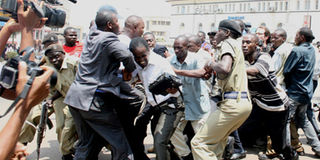Is this the end of demos in Uganda?

Police battling FDC supporters during one of their demonstrations in 2009. FILE PHOTO
What you need to know:
Police chief Kale Kayihura has said he was not informed that some opposition politicians planned to demonstrate on Monday. But the politicians say they informed him four days in advance, implying that someone is not telling the truth.
Kampala
Police chief Kale Kayihura has said he was not informed that some opposition politicians planned to demonstrate on Monday. But the politicians say they informed him four days in advance, implying that someone is not telling the truth.
What is not in doubt is that the Police deployed heavily on Sunday night, several hours before the planned demonstration, in anticipation of what would have been the first street march of 2010. This fact is at odds with Maj. Gen. Kayihura’s argument that he was unaware of the planned march until the day it would have happened.
In fact, if the authorities had not deliberately planned to block the march, called to protest the closure of CBS radio and the re-appointment of allegedly discredited officials at the Electoral Commission, many constables would have spent Sunday night in their beds.
This detail does not necessarily establish Maj. Gen. Kayihura as a liar, but it highlights the tactics available to the authorities as they start a year in which the political climate could turn severe ahead of 2011, when Ugandans go to the polls. By killing a demonstration before it could start, in the dead of night rather than in broad daylight, it appears the Police were making a profound statement: demonstrations, peaceful or not, are forbidden in 2010.
Pre-empting chaos
The success of the night-deployment strategy --- the march’s organisers, stunned by the heavy deployment, are now saying they will find other ways to express themselves --- indicates that the Police are prepared to go to great lengths to appear competent, even if it means frustrating the right to assemble. In the past, the Police battled demonstrators with tear gas and batons, the kinds of weapons whose damage was visible to the naked eye.
Now, with the September 2009 riots as the inspiration for greater paranoia and the motivation behind fresh tactics, the authorities seem to have found a strategy that conserves tear gas while also pre-empting the chaos that obtains when policemen try to stop rallies already in motion.
To maintain this anti-demonstration strategy --- and to make it work --- the authorities must keep the assumption that all assemblies called by the opposition parties threaten security in Kampala. What is more, for the new strategy to work, the Police would have to reject the opposition parties’ requests for security during demonstrations. In a statement issued after the botched march, Maj. Gen. Kayihura, without providing details, said there was “no doubt” the opposition parties were in a disinformation campaign designed to cause unrest in Kampala.
Freedom of assembly
To counter the new approach, if there is anything they can do, opposition parties, whenever they intend to convene a rally, would have to ensure that their letters to Maj. Gen. Kayihura are delivered by hand, perhaps with someone clandestinely taking a picture, so that no one gets the opportunity to spin tangled yarns.
Whether there can be a peaceful demonstration in Kampala today is hard to say, but the authorities seem to have embraced pessimism -- - the idea that it cannot happen. “It’s difficult to say yes or no,” said Dr Yasin Olum, a Makerere University political scientist. “Some of these demonstrations can get out of hand. And we don’t know which one is going to get violent.” The 1995 Constitution guarantees the right of Ugandans to peacefully assemble, but the authorities have used certain statutory instruments, seen as unconstitutional by some critics, to impose restrictions if it is imagined that the organisers have sinister intentions.
In 2008, the Constitutional Court ruled that the Police were mandated to regulate, not prohibit, rallies, a decision that gives the authorities the power to prevent assemblies from turning violent. In the case of the botched rally on Monday, it was stopped before the first placard was raised. “We cannot go ahead with the demonstration because these cowards (the Police) have surrounded us,” Ms Salaamu Musumba, a top Forum for Democratic Change official, was quoted as saying.
If cowardice is what was on display, it actually worked. Photographers captured armed policemen, some with a contrived meanness on their faces, staring down potential demonstrators, their forbidding silence providing a hint of their intentions.
Mr Livingstone Sewanyana, who heads the Foundation for Human Rights Initiative, a rights watchdog, yesterday said the Police are abusing power. “It raises the concern whether Ugandans can associate politically,” Mr Sewanyana said. “The role of the Police is basically to provide protection. We still need to campaign against this lack of respect… This trend will continue. The opposition politicians have the law on their side. They need to take advantage of that.”




